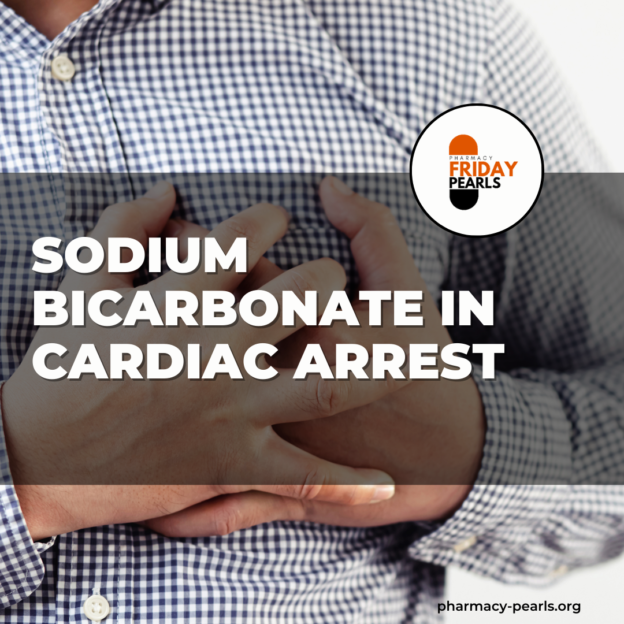Introduction
- Out-of-hospital cardiac arrest (OHCA) remains a leading cause of mortality and a substantial issue of public health concern worldwide.
- Sodium bicarbonate (SB) administration has been considered an important part of treatment for severe metabolic acidosis in cardiac arrest, because based on pathophysiologic considerations, normalization of extracellular and intracellular pH was considered a meaningful endpoint of resuscitation.
- Correction of metabolic acidosis with SB was recommended by early advanced cardiac life support (ACLS) guidelines published in 1973, and SB was the medication most frequently used during cardiac arrest until mid-1980s
- The 2010 ACLS Guidelines for adults published by the American Heart Association (AHA) state that “Routine use of sodium bicarbonate is not recommended for patients in cardiac arrest” (class lll recommendation, based on level of evidence (LOE) B)
Pharmacology
| Dose | 0.5-1 meq/kg/dose • Repeat doses should be guided by arterial blood gases | ||
| Administration | IV injection during cardiac arrest | ||
| PK/PD | Onset Iv: Rapid Duration IV: 8-10mins Excretion: Urine (<1%) | ||
| Adverse Effects | Hypocalcemia Intracellular acidosis (without adequate ventilation) HYPERNATREMIA Hyperosmosis Shift O2 release by hemoglobin | ||
| Compatibility | Sodium bicarbonate solution may inactivate catecholamines such as epinephrine | ||
- May decrease of the biological effect of epinephrine to 77- 82 % of nonalkaline solution
- not powered
Overview of Evidence
| Author, Year | Design/ sample size | NaHCO3 regimen | Outcome |
| Chen YC, 2018 | Observational/ n=5589 | Not reported | Sodium bicarbonate during ED resuscitation was significantly associated with an increased rate of survival to hospital admission. |
| Kawano T, 2017 | Prospective observational/ n=13,865 | Not reported | In OHCA patients, prehospital SB administration was associated with worse survival rate and neurological outcomes to hospital discharge. |
| Ahn S, 2017 | RCT/ n=50 | 50 mEq/L vs Placebo | No difference in sustained ROSC (4% vs 16%) or good neurological outcome (0% vs 4% , p=.1) SB had significant effect on pH (6.99 vs. 6.90, P=0.038) and bicarbonate levels (21.0 vs. 8.0 mEq/L) |
| Wang CH, 2016 | Retrospective observational study/ n=109 | Not Reported | SB was positively associated with sustained ROSC when serum potassium level was <7.9 mEq in IHCA Calcium and SB was positively associated with sustained ROSC when serum potassium level <9.4 mEq/L IHCA |
| Vukmir RB, 2005 | RCT/ n=792 | 1 mEq/kg NaHCO3 | Overall survival rate was 13.9% No difference in survival in those who received bicarbonate 2-fold increase in survival in arrest >15 min (32.8 vs 15.4)* |
| Bishop RL, 1976 | Animal+human case studies/ n=6 | 1 mEq/kg of 7.5% sodium bicarbonate in dogs 0.5-0.9 mEg/kg in humans | Animal 1 mEq/Kg SB resulted in increases in the Pco2 (27→49), pH (7.38 →7.56) and the serum osmolality (309→349) Man 0.5-0.9 mEq/Kg SB resulted in increases in the Pco2 (24.5→38.8), pH (7.23 →7.48) and the serum osmolality (308→343) |
References
- Sodium bicarbonate. Micromedex [Electronic version].Greenwood Village, CO: Truven Health Analytics. Retrieved October 11, 2018, from http://www.micromedexsolutions.com/
- Bishop RL, et al. Sodium bicarbonate administration during cardiac arrest. Effect on arterial pH PCO2, and osmolality. JAMA. 1976 Feb 2;235(5):506-9.
- Vukmir RB, et al. Sodium bicarbonate in cardiac arrest: a reappraisal. Am J Emerg Med. 1996 Mar;14(2):192206.
- Vukmir RB, et al. Sodium bicarbonate improves outcome in prolonged prehospital cardiac arrest. Am J Emerg Med. 2006 Mar;24(2):156-61.
- Wang CH,et al. The effects of calcium and sodium bicarbonate on severe hyperkalaemia during cardiopulmonary resuscitation: A retrospective cohort study of adult in-hospital cardiac arrest. Resuscitation. 2016 Jan;98:105-11.
- Ahn S, et al. Sodium bicarbonate on severe metabolic acidosis during prolonged cardiopulmonary resuscitation: a double-blind, randomized, placebo-controlled pilot study. J Thorac Dis. 2018 Apr;10(4):22952302
- Kawano T, et al. Prehospital sodium bicarbonate use could worsen long term survival with favorable neurological recovery among patients with out-of-hospital cardiac arrest. Resuscitation. 2017 Oct;119:63-69.
- Chen YC, et al. The association of emergency department administration of sodium bicarbonate after out of hospital cardiac arrest with outcomes. Am J Emerg Med. 2018 Mar 5. pii: S0735-6757(18)30187-6.
